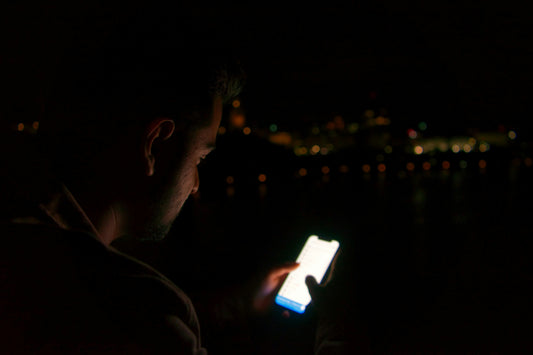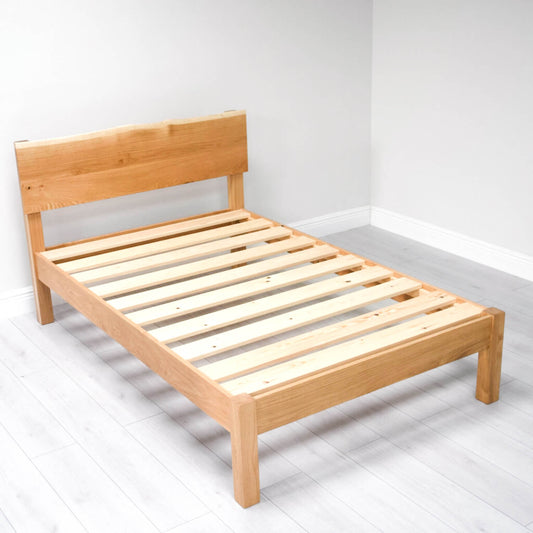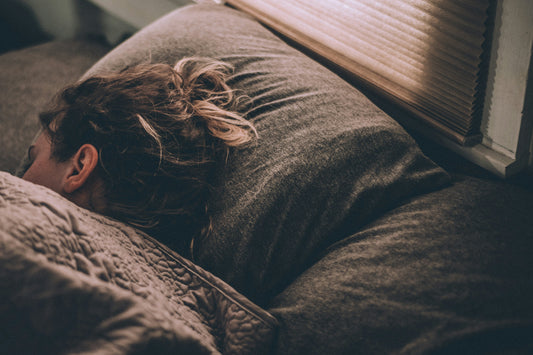The concept of blue light and its impact on sleep is not an old one. For years, journalists, scientists, and bed brands have all been commenting on its harmfulness and ability to disrupt our sleep. With so much commentary, you might be wondering what’s true and what’s hyperbole.
We’ve put the time in to get a solid grasp on blue light and how it affects sleep. Here, we’ll explain everything we’ve uncovered to reveal the truth for once and for all.
What is Blue Light?
The human eye is incredibly responsive. With over one million nerve fibres and five cranial nerves, a lot of activity takes place with our eyes. Humans can see a wide range of colours and perceive different brightness levels, measured in wavelengths on what’s called the visible light spectrum.
Blue light falls on the shorter, more energetic end of the scale, measuring between roughly 400-500 nanometres (nm) in length. Red light, by contrast, sits around the 600-750 nm range, with less energy.
Is Blue Light a Myth?
The light spectrum was demonstrated in the 1660s by Sir Isaac Newton. He shone light through a glass prism, which then broke the light down into a range of colours, which included blue.
So, while blue light does indeed exist, there is a common misconception about how harmful it can be to the eyes. While blue light can be distracting and cause more alertness, the risk of damage being done to the eyes is very low.
How Does Blue Light Affect Your Eyes?

In day-to-day life, blue light is everywhere. It comes from computer screens, televisions, and mobile phones, but these rarely cause much disruption during normal waking hours. At night, however, blue light can interfere with the body’s circadian rhythm.
Across all of the discussions on blue light and sleep, some common themes are continually brought up:
Alertness
While undertaking everyday activities, such as work or even consuming media, our bodies need to stay awake and attentive. With its high energy levels, blue light is actually quite useful in this regard, as it boosts attention spans and improves reaction times.
Sleep Duration
Although increased attentiveness during the day is a positive, the same can’t be said for nighttime. After a full day of work, our bodies slowly start to prepare themselves for sleep, with brain activity slowing down and energy levels decreasing. However, exposure to blue light during this winding down period can stimulate the eyes too much, affecting how long we sleep.
Tiredness
For many of the same reasons covered above, blue light makes us feel more energised in comparison to longer, less energetic ends of the visible light spectrum. As a result, we can naturally begin to feel more awake and energised.
What Does Academia Say?
Many studies have been conducted to try to prove this phenomenon, with a conclusive review of such studies published in 2022. Within which, it claims that half of the studies reported reduced tiredness due to blue light exposure, a fifth claimed decreased sleep quality, and a third found a reduced sleep duration. At the same time, over half of the studies found improvements to cognitive abilities, while roughly two-thirds found increased alertness and reaction times.
Where Does Blue Light Come From?

Blue light can be emitted from a range of sources, most often electronic devices such as lights and entertainment systems, such as:
- Laptop screens
- Televisions
- LED lighting
- Smartphones
- Tablets
- Handheld game consoles
- Interactive POS systems
- Fluorescent light
How to Reduce Blue Light Exposure
Realistically, anything with a screen or light source can be responsible for blue light exposure. Though, there are a few ways of reducing your exposure to blue light, which we’ll list below:
Applying Screen Filters
Many smartphone manufacturers have acknowledged that people tend to use their phones before going to sleep. Most phones these days will have something called a ‘Night mode’ or ‘Reading mode’. When activated, the colour of the phone’s screen will shift to a warmer tone, making it easier on the eyes.
To be clear, there has yet to be a conclusive study that suggests that night mode significantly decreases blue light exposure. While night mode may make your phone feel less distracting, your eyes might disagree.
Cutting Down Screen Time
The most effective method of reducing blue light exposure is to reduce the amount of time spent using or looking at screens.
Smartphones and computers have become a common part of everyday life, and they’re hard to give up entirely. As such, going cold turkey might not be possible for most of us. However, cutting down how much you use your phone, especially at night, can significantly reduce the amount of blue light exposure your eyes receive, and could help improve your sleep quality as a result.
Swapping Out Bulbs/Lamps
It’s not just screens that emit blue light. Even the lamps in your room can be disruptive. One way to reduce the distraction caused by your lights is to swap out the bulbs within them for something that’s lower powered and potentially more energy-efficient.
More Sleep Knowledge
So, there you have it. Blue light can be distracting, but it’s unlikely to cause you any major harm. For more insights into sleeping behaviour, just like this, be sure to stick to our blog.
There, you’ll find a mixture of guides and explanatory articles on sleep and wellbeing, as well as bed frame buying advice and interior inspiration to make your bedroom as relaxing as possible.















